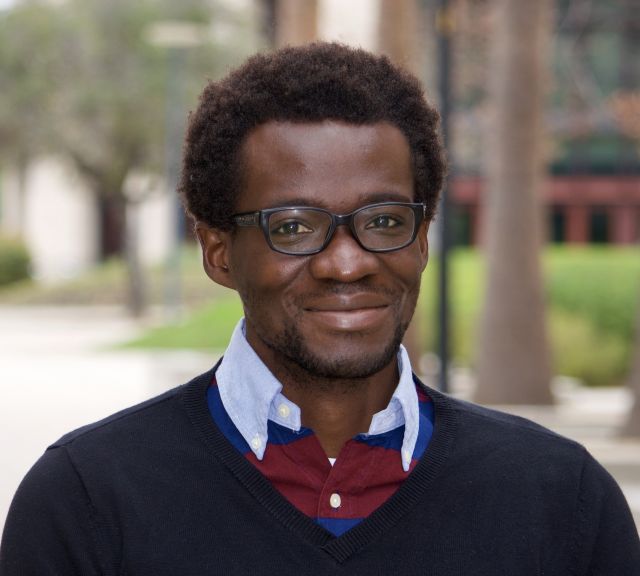Kolade Adebowale: Enhanced Substrate Stress Relaxation Promotes Filopodia-Mediated Cell Migration

SEMINAR (Zoom)
This UC Next Seminar will be hosted in person as well as online via Zoom. RSVP to receive the zoom link by emailing info@bioengineering.ucsb.edu.
Zoom will open after the host has joined at the start of each seminar. You can ask questions through the chat forum and by raising your "hand" and the speaker will call on you.
Speaker
Kolade Adebowale
Postdoctoral Fellow
Harvard University
9:25 am via ZOOM
Enhanced Substrate Stress Relaxation Promotes Filopodia-Mediated Cell Migration
Abstract
Cell migration is typically characterized by lamellipodia at the leading edge, mature focal adhesions, and spread morphologies. These observations result from migration studies on stiff elastic substrates. However, many biological tissues are soft, with an initial elastic modulus of ~1 kPa, and are also viscoelastic, exhibiting stress relaxation over time in response to a deformation.
Here, we systematically investigate the impact of substrate stress relaxation (SR) on cell migration on soft, compliant substrates with tunable SR properties. The substrate is an interpenetrating network of alginate and recombinant basement membrane with an initial modulus of 1.5 kPa. Cancer cells were cultured on substrates that have the same initial modulus but varying levels of SR, with characteristic stress relaxation half times similar to what is observed for biological tissues (~100 s to ~2,000 s).
We find that migration speed and persistence is enhanced with faster SR (fSR). Strikingly, cancer cells migrating on soft fSR substrates were not spread and did not extend lamellipodial protrusions, but were instead rounded, with filopodia protrusions extending at the leading edge, and exhibited small nascent adhesions. Motor-clutch computational modeling predicted the observed experimental results of substrate stress relaxation on cell migration. Furthermore, the model provided additional mechanistic insight regarding the mechanosensitivity of filopodia protrusions.
Together, our findings establish substrate stress relaxation as a key requirement for robust cell migration on soft substrates and uncover a previously undescribed mode of cell migration marked by round morphologies, filopodia protrusions, and weak adhesions.
Bio
Kolade Adebowale is currently a postdoctoral fellow in bioengineering at Harvard University / Wyss Institute. He received his PhD in chemical engineering from Stanford University. His research interests lie at the interface of mechanobiology, bioengineering, and human health. At Stanford, he demonstrated that biomaterial viscoelasticity is a key regulator of cancer cell migration. At Harvard, he is using ex vivo solid tumor models to develop quantitative approaches to immune cell-based therapies. Outside of lab he enjoys photography, hanging out with friends, and photography. He is looking to continue his independent research in a tenure-track position.